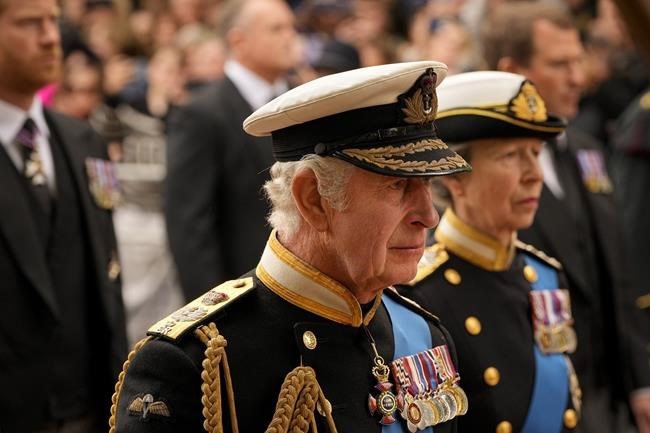MONTREAL — The debate over Quebec's power to unilaterally change the Canadian Constitution has resurfaced as members of an opposition party refused Wednesday to swear allegiance to King Charles III.
The 11 members of Québec solidaire declared their loyalty to the Quebec people, but they did not swear loyalty to the King, as required by the Constitution.
Describing the oath as "colonial, archaic and out-of-date," Québec solidaire spokesman Gabriel Nadeau-Dubois said after the swearing-in ceremony that he's been told his party's members won't be able to sit in the legislature until they swear the full oath — though they will have access to their offices and funding.
Nadeau-Dubois told reporters he now wants to work with the other parties to find a way for his members to sit when the legislature reconvenes Nov. 29 without having to swear the oath.
"It's our responsibility as parliamentarians to find a way out of this current cul-de-sac," he said.
Parti Québécois Leader Paul St-Pierre Plamondon said earlier this week that the three members of his party elected Oct. 3 will also refuse the oath when their turn comes Friday.
Constitutional experts are divided on whether the legislature can allow members to sit without swearing the oath and whether Quebec has the ability to change the oath on its own.
Patrick Taillon, a law professor at Université Laval in Quebec City, said the Constitution is clear that members of all legislatures have an obligation to swear allegiance to the monarch, but that the consequence of not swearing the oath — and whether those members will be able to sit in the national assembly, participate in debates and vote — is up to the legislature itself.
While Taillon acknowledged in an interview that constitutional law experts are not unanimous, he thinks the province could unilaterally change the oath through its power to change elements of the Constitution that affect only Quebec.
In 1968, he noted, Quebec unilaterally eliminated its upper house, a body whose existence and structure was provided for in the Constitution. More recently, Quebec passed language legislation in May changing the Constitution to declare that Quebecers form a nation and that French is the province's only official language.
Taillon said the oath is not a declaration of personal loyalty to King Charles, but rather to what the Crown represents. Replacing the name of the monarch with “our laws and our institutions" would create an oath with essentially the same meaning, he said.
“I think that would be a very minor constitutional change, quite in keeping with the spirit of the Constitution, and I don't see how the courts could overturn it," he said.
But Emmett Macfarlane, a political science professor at the University of Waterloo who studies the Constitution, said he doesn't believe the province's legislature can allow people to sit without swearing the oath.
"It means they are constitutionally ineligible to sit in the legislature," he said in an interview. "The Constitution is quite clear that this particular oath is required."
Macfarlane said that unlike the elimination of the upper house, which applied only to Quebec, the oath is a requirement of the Constitution that applies to all members of provincial legislatures and Parliament.
"It is not a feature of the provincial constitution of Quebec. It is a feature of the federal Constitution and so it's out of reach for the Quebec national assembly to unilaterally change," he said, adding that it would require a constitutional amendment.
While Macfarlane said there's nothing wrong with debating the wording of the oath, it remains part of the Constitution.
"We should be deeply concerned any time the Constitution is flagrantly ignored by elected officials. It's dangerous. It's corrosive to our existence as a democracy," he said.
In Ottawa, Prime Minister Justin Trudeau told reporters it is up to the Quebec legislature to decide how it manages the swearing-in process.
Later in the day, he closed the door to any constitutional change. "I won't speculate on what the national assembly can or cannot do. What I can tell you is that there's not one Quebecer who wants us to reopen the Constitution," he told reporters.
This report by The Canadian Press was first published Oct. 19, 2022.
— With files from Émilie Bergeron in Ottawa.
Jacob Serebrin, The Canadian Press



